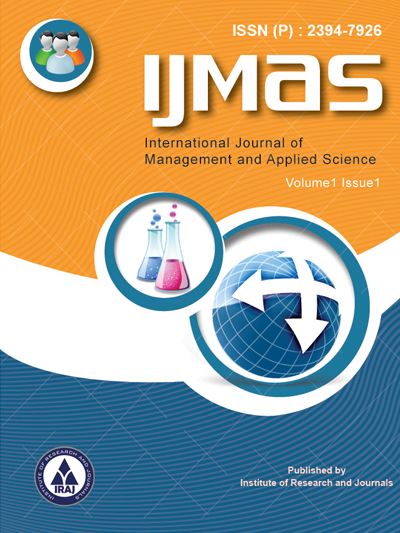Publish In |
International Journal of Management and Applied Science (IJMAS)-IJMAS |
 Journal Home Volume Issue |
||||||||
Issue |
Volume-2,Issue-12 ( Dec, 2016 ) | |||||||||
Paper Title |
Analysing The Role of Government Regulations & Intervention in E-Rickshaw Industry of Delhi | |||||||||
Author Name |
Ritu Khanna, Shikha Singh, Raman Arora, Harshiel Chahal, Aleena Khan, Arushi Gupta, Muskan Gupta, Talat Khanam | |||||||||
Affilition |
Associate Professor, Department of Economics, Daulat Ram College, University of Delhi Department of Economics, Daulat Ram College, University of Delhi | |||||||||
Pages |
64-69 | |||||||||
Abstract |
In an era where urban mobility plays a vital role in the economic growth, e-rickshaws have emerged as a promising mode of transport in Delhi. With zero emissions, high accessibility and low operational costs, they provided a shot in the arm to Delhi’s landscape within the first few years of their introduction. However, a policy failure and lack of state involvement in the industry failed to exploit it to its optimum best. These unregistered vehicles operated by unlicensed drivers sprouted within a legal ambiguity until the incidents of negligent driving reached an intolerable high. Hence, this study is an attempt to analyse the role of effective governance in the e-rickshaw industry of Delhi conducted against the backdrop of a dearth of existing literature and reliable data on e-rickshaws. It is based on findings of a primary research survey of 220 e-rickshaw drivers in Delhi and an intensive review of the concerned legislations. In a time span of five years, a multitude of institutions worked in isolation to form policies to regulate these battery operated vehicles but no substantive gains were made until the Motor Vehicles Act (Amendment) 2015. However, even the Amendment could not hinder the blatant flout of registration provisions and safety requirements by the e-rickshaw drivers. The government failed to provide basic infrastructure including charging stations and credit facilities to their operators. Lack of coherency in policies, neglect of lead contamination from batteries and unchecked import of vehicle parts are some other challenges identified by the study. Finally, the paper suggests some key policy recommendations including a single, unified regulatory authority to design a well-integrated transit policy, infrastructural improvements through installation of charging stations, parking facilities and halt and go stops, and governance systems enabling fleet based operations. Best practices from few success stories have also been assessed for better organisation of this informal sector. Keywords— E-rickshaws, Regulations, Government, Urban Public Transport. | |||||||||
| View Paper | ||||||||||